Welcome to the week. Here are the most notable news items our community has come across in the past seven days.
Remembering Donald Shoup: Shoup, author of the seminal book, High Cost of Free Parking, passed away over the weekend. He was a giant in urbanism for his clear and creative thinking around parking and the need for reform. (Parking Reform Network)
Rail bills in Salem: There’s a full station of legislative bills that have been introduced down in Salem this session. They look to capitalize on growing ridership and realize rail’s potential as a mass people mover. (KGW-TV)
Green wave in NYC: Cool to see more awareness for signal timing that specifically benefits bicycle users, like NYC DOT has implemented in Manhattan — and that Portland has been doing downtown for decades. (NY Times)
Drivers ruin everything: A major professional road race was thrown into chaos when drivers made their way onto the course at several different locations. (CNN)
Reduced demand: One month after congestion pricing went into effect, over one million cars have been taken off the road. It’s just the latest sign that the program has been a sweeping success. (Fast Company)
Bike tourism trends: If you are in any job or field related to bike tourism, don’t miss this excellent summary of some of the top trends to grow the pie in 2025. (European Cyclists’ Federation)
Sentencing in Portland couples’ death: The driver of a truck whose load fell off and hit and killed Portland couple Michelle and Christian Deaton while they were cycling in Napa, California in 2023 was given a one-year jail sentence. (Patch)
True safety after dark: In London, officials are not just talking about how women are at greater risk when riding after dark; they are doing something about it. They’ve deemed some routes “socially unsafe” due to a lack of lighting and escape routes. (BBC)
Thanks to everyone who sent in links this week. The Monday Roundup is a community effort, so please feel free to send us any great stories you come across.



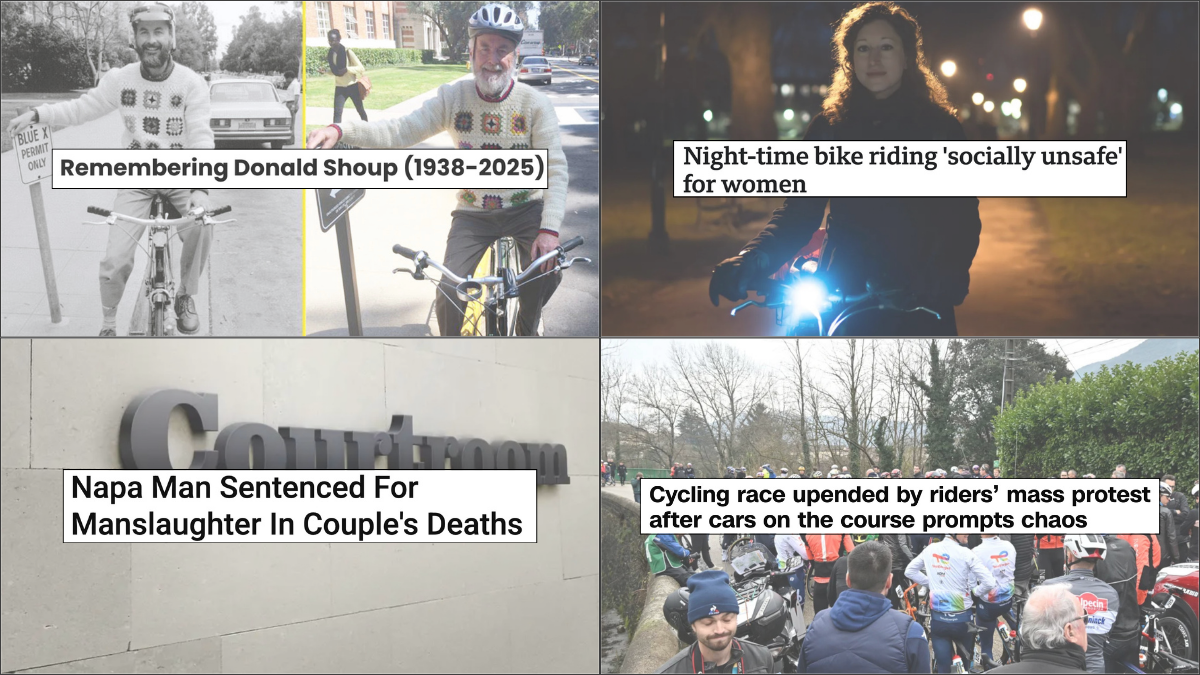
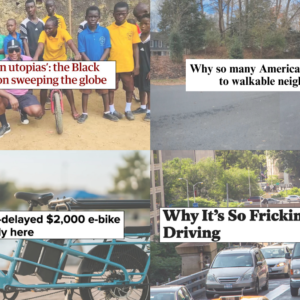
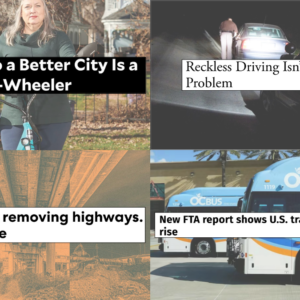
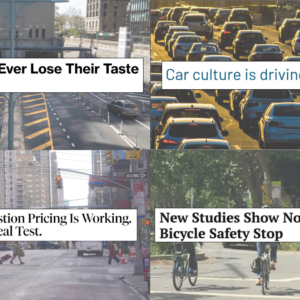
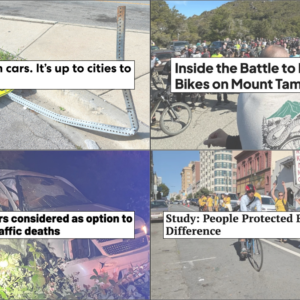
Thanks for reading.
BikePortland has served this community with independent community journalism since 2005. We rely on subscriptions from readers like you to survive. Your financial support is vital in keeping this valuable resource alive and well.
Please subscribe today to strengthen and expand our work.
As far as the BBC article goes, I’m not sure if telling people which routes are unsafe actually counts as doing something. It seems more like just giving up and ceding those areas and routes to lawless behavior.
Also, I don’t know why they try to soften the lack of safety by calling it “social” safety.
It seems from the descriptions that its just straight up safety that is a concern. Safety from assault, sexual assault, harassment and theft mostly targeted at a specific sex, but is applicable to all.
Its unfortunate that self defense if frowned upon in England. Legally its nearly impossible to carry a handgun for self defense as self defense is not a recognized use of a firearm there.
https://www.politics.co.uk/reference/gun-crime/
Also, tasers are considered a prohibited weapon as are knives and most anything else to dissuade an attacker except for some forms of pepper spray, a whistle or a loud cry for help.
The situation the UK find itself with ceding bicycle routes to lawlessness is not one that can be reversed overnight and as usual it is the truly vulnerable who face the most danger from the breakdown in society’s ability to maintain order.
A truly atrocious situation!
So…very….unfortunate:
England: 0.03 firearm homicides/100000
USA: 584 firearm homicides/100000 (85.7% of total violent deaths)
And more important, as it pertains to the safety of women:
Allowing personal firearms at the level seen in the US would be devastating for women in the UK.
https://everytownresearch.org/report/guns-and-violence-against-women/
So we are all agreed that violence against women is reprehensible.
What would you do to help women in the situations mentioned in the article? About the same as the help they are getting on the Springwater, in the camps or in Portland itself?
Does it really matter what I say? Your position requires a fundamental change in an entire nation’s weapon laws and an assumption that the change won’t end up making it worse for women in the UK overall. This isn’t a discussion about realistic solutions.
I agree — the idea that the UK would legalize guns for personal defense seems as likely as the prospect we would give ours up.
There is no realistic possibility of either.
I don’t know about the UK, but here in the US, we need practical ideas for reducing the carnage.
Lots of interesting parallels with cars here, including the rapidly changing technological landscape.
I believe that there is a realistic possibility of both happening. I think that guns and handguns in particular haven’t been outlawed all that long in England and since they are mutable laws and not rights than there is a chance that they could be re-introduced. Here in Washington we can’t buy “assault rifles” (for all those nitpickers out there I am using quotes as there is not clear agreement on what those words mean) or magazines greater than 10 rounds for anything (unless you are police or a bodyguard for a politician or a rich person) so there is a foreseeable path to an outright ban.
But that is a minor point.
The greater point is the way in which the Brits have banned handguns can be used to ban certain types of vehicles such as the giant trucks and suv’s that do a lot of the killing on our streets.
Below is some UK Gov guidance on issuing firearm certificates. Mentally substitute firearm/ammunition with car or automobile or SUV or vehicle over 2500lbs and you see a way to treat automobiles as the deadly devices they are. Imagine having to demonstrate “good reason” to own a car. It would be amazing.
12.2 Under section 27(1)(b) of the Firearms Act 1968, firearm certificates shall be granted by chief officers of police if they are satisfied that applicants have a “good reason” for having in their possession, or for purchasing or acquiring, the firearm or ammunition in respect of which applications are made and that in all the circumstances the applicants can be permitted to have the firearm or ammunition in their possession without danger to public safety or to the peace. Apart from assessing fitness to possess firearms, “good reason” is one of the most substantial and complex areas of discretion that chief officers may exercise in licensing firearms. It is therefore imperative that any decision to refuse on grounds of “good reason” must be reasonable.
12.3 This guidance is not exhaustive. Chief officers will encounter cases not covered here where they may properly judge that “good reason” is proven. Each case must be judged on its own merits, being mindful of the consistent administration of the Acts and the need to provide fair and equitable treatment to all applicants, while maintaining the duty to protect the public from firearm misuse.
12.4 Apart from having a “good reason” in principle, an applicant’s reasons for owning firearms should be genuine. Equally, any reason to refuse an application must be clearly justified and explained. Chief officers should exercise caution in dealing with cases where the applicant presents a nominal reason for possessing firearms without supporting evidence. The police will be expected to make reasonable inquiries to verify the applicant’s “good reason” for the possession of firearms.
https://www.gov.uk/government/publications/firearms-law-guidance-to-the-police-2012/guide-on-firearms-licensing-law-accessible-version#chapter-12-good-reason-to-possess-a-firearm
You explained where you see a possibility of the Brits taking up personal firearms again, but not how you see us putting ours away.
I think most folks there look at what’s happening here and say “no way”.
Once, quite a few years back, on a Pacific Coast bike tour I met up with some Euros in Brookings. A Brit guy and a Swiss woman. A group of us left camp and rode to Fred Meyer for evening provisions. We all walked past the outdoors section where, at the time, some sorts of firearms were available. For all I know and can recall now, they were pellet guns, though I think they were hunting rifles and the like. The Euros, thinking we were headed to a grocery store in the way they are familiar with, looking for snacks and beer, were aghast. “Honey, please, when you’re at the store, we need eggs, butter and more guns” were mocking phrases thrown at us all night. “You can buy milk and a gun, at the same time, this is where your violence problems begin”. So yeah, I too think people look at us and think we’re absolutely nuts, for a solid number of reasons, and do not think following our lead on social issues makes a lot of (any) sense.
Seriously… people need to avoid guns when they’re on milk.
My mistake, I thought you meant car related carnage. Hence the long post on how to do that by restricting access to cars if only federal or even state politicians were interested in actually doing something about it.
As far as our firearm related carnage, the easy answer is to vastly upgrade the nation’s mental health system to provide counseling, possible medication and follow up counseling for any and all who need it. I know it’s easy and feels delightfully authoritarian to make people give up things and take them away from them, but if you are really wanting to slow the carnage than that is a great place to start.
Though they tend to get less public attention than gun-related murders, suicides have long accounted for the majority of U.S. gun deaths. In 2021, 54% of all gun-related deaths in the U.S. were suicides (26,328), while 43% were murders (20,958), according to the CDC. The remaining gun deaths that year were accidental (549), involved law enforcement (537) or had undetermined circumstances (458).
As far as the UK folks looking here and saying, “no way”, why not expound your view to some other places that aren’t majority white and well off from looting the world for centuries? Like the cyclists who can’t stop going on about how amazing those old, wealthy (from looting the world for centuries) and white tiny little countries handle their bicycle infrastructure, anti-gun types also forget that there is a big world out there.
The U.S. gun death rate was 10.6 per 100,000 people in 2016, the most recent year in the study, which used a somewhat different methodology from the CDC. That was far higher than in countries such as Canada (2.1 per 100,000) and Australia (1.0), as well as European nations such as France (2.7), Germany (0.9) and Spain (0.6). But the rate in the U.S. was much lower than in El Salvador (39.2 per 100,000 people), Venezuela (38.7), Guatemala (32.3), Colombia (25.9) and Honduras (22.5), the study found. Overall, the U.S. ranked 20th in its gun fatality rate that year.
If you want a blueprint for incremental change, look at classification of firearms. Look at machine guns. They’re legal to own, but not imported for civilian use anymore and therefore their cost and availability act as a defacto ban. I sure can’t buy one. It’s essentially the frog in a slowly warming pot approach. Just keep banning more and more features and rely on the 9th circuit to keep anything that could change the status quo from getting to the SC.
The overall point is that like deaths that cars cause the political powers don’t care about gun deaths and only go so far in support or against to furnish votes from their base. Social pressure is needed to actually change the slaughter. Changing material items might seem easier, but changing people’s perception and goals will have longer outcomes.
The question I have is why you would want to be the only one without arms in a nation where the police, military and our master’s private security are the only ones armed? I imagine you are a student of history and know the lesson of what gets banned early on in totalitarian societies followed by the literal deaths of millions. If you think it can’t happen in the US, what are your reasons. I’m honestly curious.
That’s probably not a sufficient answer, but there are plenty of good reasons to do it regardless.
I’ll bet you you could, if you were willing to break the law. Which is fundamentally the rub of the situation. Asking folks to give up guns would be hard enough, but asking them to do so while there are plenty of illegal guns in circulation would be quite a bit harder.
This is an interesting point — there is currently a huge overlap between those who want to restrict gun ownership and those who claim we’re rapidly sinking into a totalitarian dictatorship and have possibly voted in our last presidential election.
Interestingly, automation of transport will make our streets safer, while 3D printing of guns will almost certainly do the opposite.
“I’ll bet you you could, if you were willing to break the law“
A fair point. I could buy or print one of the infamous Glock switches (if I had a Glock of course) and have my very own Glock 18, but only on the caveat that I was willing to break a firearm law in very blue Washington. Otherwise I wouldn’t know where to go for an illegal machine gun.
“there is currently a huge overlap between those who want to restrict gun ownership and those who claim we’re rapidly sinking into a totalitarian dictatorship and have possibly voted in our last presidential election.”
If anyone here shares this viewpoint I would very much enjoy hearing your point of view.
“This isn’t a discussion about realistic solutions.“
I know you’ve been commenting on here for too long to say that with a straight face 🙂
I don’t agree with any of that.
Telling people which routes are unsafe IS doing something. And it’s not “giving up” as it’s clear that’s not all that’s being done. From the article, the LCC wants those safety factors to be included in route quality assessments, and want routes that fail to not be approved or funded, which is also doing something. There’s no indication people aren’t planning to then follow up with making safety improvements so those routes can be approved and funded.
I agree “social safety” seems week, but it doesn’t seem like an attempt to soften the lack of safety. From the article: ” “Socially unsafe” is the term used for routes where there is a risk of harm from others due to factors such as poor lighting and a lack of escape routes.” It looks clear it’s an attempt to label types of safety concerns that aren’t, say, related to traffic volume or availability of bike lanes.
I’d like to see Portland do something similar–identifying routes that aren’t safe due to non-traffic issues, point them out (which involves admitting those routes have those problems, which in itself would be progress) and then addressing the problems.
Thats a nice way to think about it. Your definition of “social safety” makes a lot of sense (I still think its a bad way to phrase it, but I now see the intent). Yeah, I agree that it would make a lot of sense to name and publish areas that are dangerous because of traffic, lack of maintenance and social/people reasons there as well as in Portland. No reason why paths can’t have more than one designation either. That would be constructive especially if there was some kind of trigger that after designation of that section or area being unsafe that there was a certain time period to fix it. Clearly something needs to be done in order to provide safety to vulnerable (and all) cyclists and I see how this could be used as a first step. I just hope there is follow up after the designations to actually improve the safety.
Anyway, i appreciate the constructive comment, its nice to have discussions and it helped me see the intent better.
A gilded statue of an economist would be ridiculous, but who has more to say to 21st century Portland, Jean d’Arc or Donald Shoup?
From the article:
https://nyc.streetsblog.org/2024/04/18/donald-shoup-heres-a-parking-policy-that-works-for-the-people
Amen and RIP.